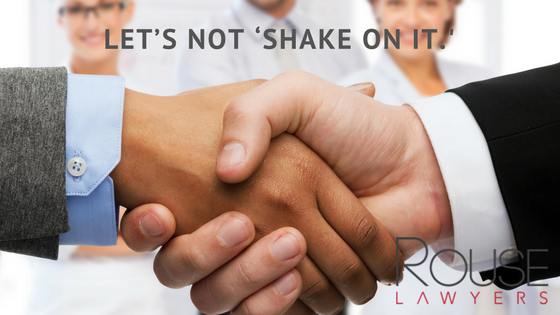
The handshake has existed in some form or another for thousands of years – popular theory is the gesture began as a way of conveying peaceful intentions and demonstrating the hand holds no weapon.
For many people, a handshake now means, ‘we have a deal’.
The problem with a handshake deal is, even if everyone has good intentions, there’s no way to ensure all parties are on the same page. Often when handshake deals go wrong, it has nothing to do with trust, but rather human error. We tend to remember the gist of a conversation along with the details our brain picks and chooses, and when there’s an oral agreement it’s far less likely that everyone has turned their minds to:
- The finer details that push the deal along; and
- What happens if something goes wrong or a party can’t perform their end of the bargain.
It is certainly possible to rely upon the terms of an oral agreement, but ultimately it will be a case of he said/she said, and a dispute over an oral agreement becomes far more involved than just considering the words that were spoken.
Commercial deals should always be documented in writing, preferably by a lawyer. It isn’t sceptical to have a lawyer prepare a commercial agreement, it’s a prudent way to manage risk, so the deal struck turns out the way everyone intended (or to provide a remedy if it doesn’t).
Of course, written agreements aren’t always foolproof. Agreements can change over time out of necessity, and by virtue of the parties’ conduct. A simple solution to this is to revisit the original written agreement and amend it to reflect the new course the deal has taken.
Takeaways
1. Oral agreements can be binding, but they are not worth the risk.
2. Shake hands, then put the deal in writing before you do anything else.
3. If the deal changes, amend the written agreement to reflect the change.
If you need assistance with your written agreement, contact the Corporate & Commercial Team at Rouse Lawyers today.
